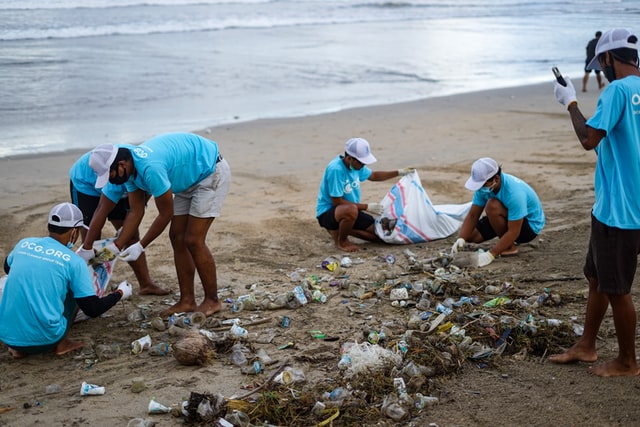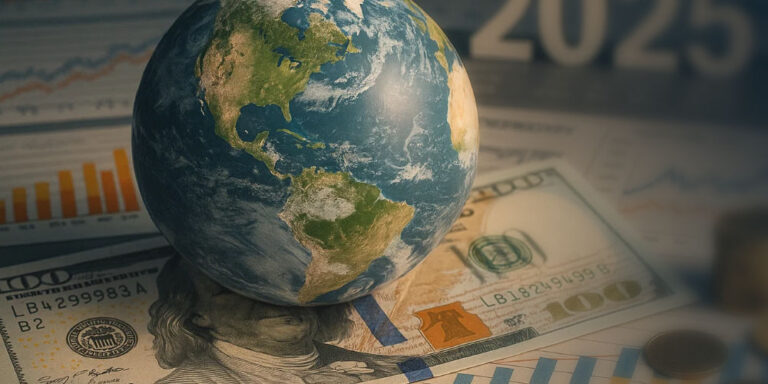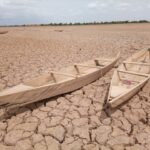Keep calm and carry on!
Is plastic in the ocean a problem?
Duration: 50 minutes.
Let’s talk about the issues raised in this short video from the Guardian.
The issue of plastic in nature, particularly in our oceans, is a global crisis. Every minute, about a dump-truck load of plastic goes into the oceans, sullying beaches, hurting wildlife, and contaminating our food supply.
What about the environment?
There are wide-ranging concerns about the impacts of microplastics on our environment, in particular on our marine wildlife. But as with impacts on humans, it is a challenge for scientists to tease out the impacts of microplastics from all the other things that animals are exposed to.
Lauren Roman, at CSIRO oceans and atmosphere, says that for all animals “the size of the plastic matters”. “If the piece is too big, the animal won’t eat it or, in the case of seabirds, they will regurgitate it. If it’s very small, then it can just pass straight through them.”
For larger pieces, Roman says there is some evidence that plastic accumulating in the stomachs of animals can suppress their appetite – known as the “dietary dilution effect” that could have knock-on effects.
What should we do?
The experts the Guardian spoke to agreed a wise step here is to reduce our use and exposure to plastics. From an environmental perspective, campaigners say we should be cutting out unnecessary plastic use, including single-use items, and substituting plastics where we can.
But Browne also had words of caution. “If we are going to do that, we should make sure that as we intercept or redesign products we don’t cause more problems,” he says.
“Remembering that some asbestos was used in clothing – it’s a natural fibre but it causes all sorts of serious issues for people.”
Discussion questions.
The environment is everything around us and is very important. It is our home, after all! If we don’t take care of it, nobody will take care of it.
Do you ever worry about the environment?
Simple English: Yes, I do worry about the environment. I think it’s important to take care of the planet and try to reduce pollution and waste.
Advanced English: Environmental concerns are a significant issue for me, and I consider them a crucial factor in our society’s future. The potential consequences of human actions, including climate change, air and water pollution, and biodiversity loss, are alarming and demand immediate attention. Therefore, I believe in the importance of individual and collective efforts to reduce environmental harm, such as waste reduction, adopting renewable energy sources, and supporting environmentally friendly policies.
Why are microplastics such an environmental concern?
Simple English: Microplastics are tiny pieces of plastic that come from products like cosmetics, clothing, and plastic waste that break down over time. They are a concern because they are harmful to the environment and can be ingested by animals and end up in the food chain. This can cause health problems for animals and eventually for humans too.
Advanced English: Microplastics are small plastic particles that are less than 5mm in size and can come from a range of sources, including the breakdown of larger plastic debris, synthetic textiles, and personal care products like toothpaste and exfoliants. Due to their small size and abundance, they are a major environmental concern. These tiny particles can be ingested by animals and can accumulate in their tissues, leading to a range of health concerns. Additionally, microplastics can absorb harmful chemicals and pollutants from the surrounding environment, which can then be transferred to animals and eventually to humans through the food chain. This can have serious consequences for human health, including endocrine disruption, cancer, and developmental and reproductive problems. Furthermore, microplastics are extremely persistent in the environment, taking hundreds of years to break down, and their long-term impacts are not yet fully understood.
What can governments do to save our environment?
Simple English: Governments can pass laws and regulations to protect the environment, invest in green technologies, and promote sustainable practices to reduce pollution and greenhouse gas emissions.
Advanced English: Governments can play a critical role in protecting the environment by implementing policies and programs that encourage sustainable development, conservation, and climate action. This can include passing legislation and regulations that set limits on pollution and emissions, investing in renewable energy and green technologies, and providing incentives and support for individuals and businesses to adopt sustainable practices. Additionally, governments can work to raise public awareness and engagement on environmental issues through education campaigns and public outreach initiatives, and collaborate with other countries and international organizations to develop coordinated strategies to address global environmental challenges. Ultimately, the success of these efforts will depend on political will, effective implementation, and ongoing commitment to prioritizing the health and sustainability of our planet.
1. Do you ever worry about the environment?
2. Have you read or heard any news stories recently about the environment?
3. Why are microplastics such an environmental concern?
4. What can we do to stop this issue?
5. Is there a concern with clean water in your country? If so, why is there a issue?
6. Is there a concern with clean air in your country? If so, what are the reasons for that?
7. What type of waste does São Paulo or Brazil produce?
8. How does it affect you?
9. What can governments do to save our environment?
10. What can you do to help the environment?
11. Imagine it’s 60 years in the future.
What will young people be saying about how we treated the environment?
Photo by OCG Saving The Ocean on Unsplash
Source: www.theguardian.com








